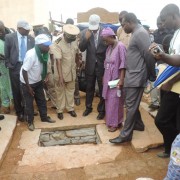In the spirit of Aid effectiveness and the premise that development built on collaboration is more likely to engender local leadership and ownership, and turn good ideas into lasting results, USAID/Mali hereby invites review and comment on its Results Framework Paper (RF Paper). The RF Paper will inform USAID/Mali's Country Development Cooperation Strategy for 2015-2019. In the coming months, USAID/Mali will consult with the host government, donors, key stakeholders including civil society and the private sector on this strategic framework.

From September 25 to 27, the USAID/Mali Director Gary Juste embarked on a series of certifications of the first villages that reached the Open Defecation Free status, an innovative water supply, sanitation, and hygiene (WASHplus led by FHI 360) approach funded by the United States Government via USAID and implemented through CARE International and two Malian NGOs (YAG-TU and Sahel Eco). For reaching Open Defecation Free status, three villages in Mopti region in the northern half of the country that are also priority for USAID's Feed the Future and Global Health initiatives, were recognized: Allaye-Daga (Commune of Sio), Wendeguele (commune of Dandoli) and Kanikombole (Commune of Kani-Bonzo).

The U.S.-Africa Leaders Summit Signature Event, "Investing in Women for Peace and Prosperity" provided meaningful discussion on improving gender equality and female empowerment in Africa. Dr. Jill Biden's comments included stories about women she met on her recent trip to Africa and their perseverance in the face of medical issues, sexual violence, cost of higher education and conflict. Ambassador Samantha Power posed thoughtful questions and reinforced U.S. commitment to gender issues.
Despite the challenges in 2012 due to the political instability and food insecurity, many important results were achieved.
Mali’s Feed the Future strategy will launch a new generation of rural entrepreneurs through the development of agricultural and health systems , the introduction of technological innovations and by building institutional capacity to spur a private sector-led approach to sustainably reduce poverty and hunger in Mali.








Comment
Make a general inquiry or suggest an improvement.